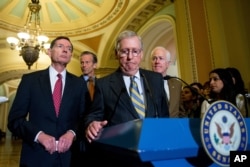U.S. President Barack Obama returned to the school where he once taught to warn Republicans' "unprecedented" refusal to consider his Supreme Court nominee could erode the "institutional integrity of the judicial branch" and cause the American people to lose confidence in the court.
"If you start getting into a situation in which the process of appointing judges is so broken, so partisan that a eminently qualified jurist cannot get even get a hearing - then we are going to see the kinds of sharp partisan polarization that have come to characterize our electoral politics seeping entirely into the judicial system," Obama said.
The president’s remarks Thursday came during a town hall with federal and state judges, students and faculty at University of Chicago’s law school, where he taught constitutional law for nearly a decade.
"It was really fun and I missed it," he joked.
The American president used the opportunity to make the case on why the U.S. Senate should consider his nomination of Garland to the nine-member Supreme Court.
"Merrick Garland is an extraordinary jurist who is indisputably qualified to serve on the highest court of the land, and nobody really argues otherwise," Obama said.
Top Republicans Still Oppose Vote
The president nominated chief judge Garland in March to fill the vacancy on the nine-seat Supreme Court bench, following the sudden death in February of Justice Antonin Scalia, a conservative stalwart on the country's highest court for nearly 30 years.
Leaders of the Republican-controlled Senate, including Majority Leader Mitch McConnell, have adamantly said the congressional body will not hold any hearings or a confirmation vote on Garland's nomination.
"I'm sure he will repeatedly claim that his nominee is quote - moderate - end quote. Not that he means it. It's just a useful piece of spam that's been dutifully echoed across the expanse of the left and in the media for years," McConnell said on the Senate floor Thursday.
He and other top Republicans say the lifetime appointment to the Supreme Court should be left to the next president - the person who wins the November national election to replace Obama when he leaves office in January 2017.
Scalia was part of the five-member bloc of conservative justices who often held sway in key decisions over the court's four liberal justices. As a result, his replacement, no matter who it is, could hold a key vote in court rulings for decades.
"They [Obama administration] will say what they always say to get what they want today, a far-left Supreme Court for decades to come," McConnell said.
Some Republican senators have started to meet with Garland and called for hearings on his nomination, but Senate Judiciary Committee Chair Senator Chuck Grassley, who controls that decision, on Thursday repeated his opposition to holding a hearing for the nominee.
Republicans are banking on the notion that they will win the presidency in November and come January will have a president who would make a conservative Supreme Court nomination more to their liking than Garland.
Conversely, some Republicans already are suggesting they could consider Garland's nomination after the election if a Democrat wins the presidency, on the theory that the likely Democratic presidential nominee, former Secretary of State Hillary Clinton, could nominate someone more liberal than Garland.






